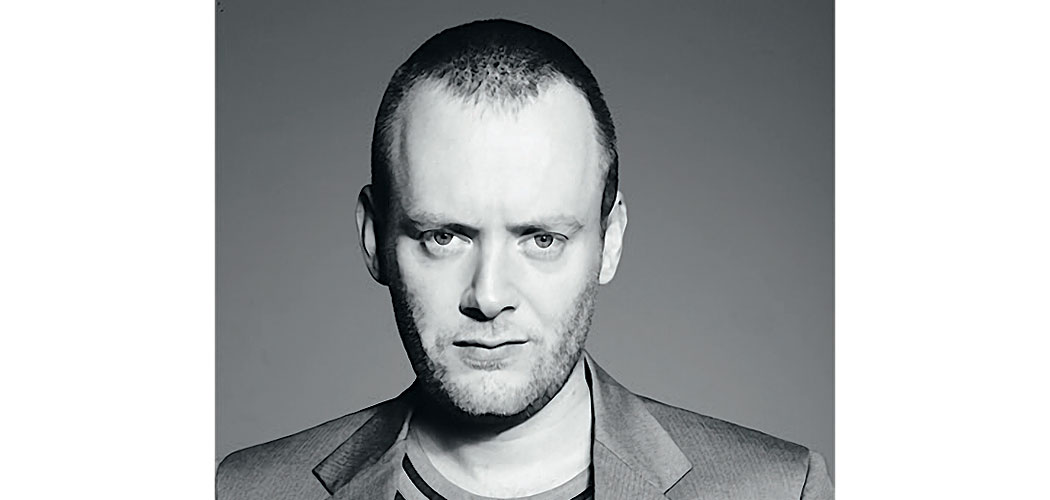Matthew Todd is a multi award-winning author and journalist. He is the writer of Straight Jacket – Overcoming Society’s Legacy of Gay Shame, and the play Blowing Whistles. He was the editor of Attitude between 2008 and 2016 for which he won three British Society of Magazine Editors’ awards. Matthew has now written Pride: The Story of the LGBTQ Equality Movement, an illustrated history of LGBTQ protest and success; as Matthew writes we have gone in 50 years from “outlaws to in-laws”. David Bridle spoke to Matthew on the morning of this year’s Pride march to talk about his new book and his own life journey as a gay man.
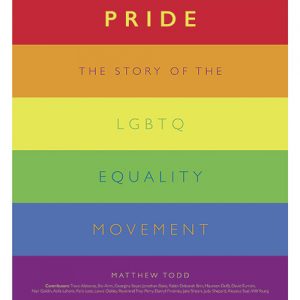
Why did you write the Pride book?
I had grown up through this horrific, horrible time of the 1980s – like Section 28 – and it felt like no-one was talking about it, no-one was telling the story of my experience. So when I was at Attitude I was always keen to write about that. When I did Straight Jacket, there’s an early chapter about the ‘80s and Section 28 and it was really fascinating to me that it was something that young people have always responded to. People have constantly said to me, ‘I had no idea that it was like that, no idea it was that bad’. They didn’t know any of the history. One of the things I say in Straight Jacket is that there should be more films, more books, more diverse storytelling about our lives and part of that is history. Then I heard that Carlton Books wanted to do something to mark the Stonewall anniversary, and I thought it was a great opportunity.
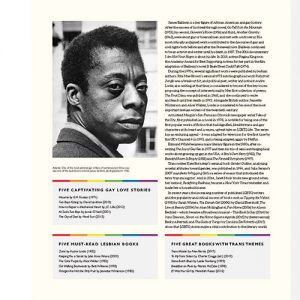
You did a lot of research around the Stonewall riots, what were the particular things that surprised you?
I had grown up believing the narrative that it was all about Judy Garland, and I do think that her death played a part. The narrative had always been that everyone had been so upset that they had freaked out and been pushed over the edge that night by the raid. There’s a really fantastic book about Stonewall by a guy called David Carter who is really hot on saying that was an almost homophobic narrative that was put up by some gay men to kind of dismiss the riots, to say it was just a bunch of hysterical prissy queens getting upset about Judy. When in fact it did come in the context of the 1960s, the Cuban missile crisis, JFK being shot, the black civil rights movement, feminists storming the Miss America event, the peace and love movement and the anti-war movement. Some activists within the Mattachine Society were frustrated that it was too conservative and that they needed to be a bit more aggressive and proactive, not just gently asking and petitioning and protesting but actually being really in your face – and I think that’s the key reason why it really happened.
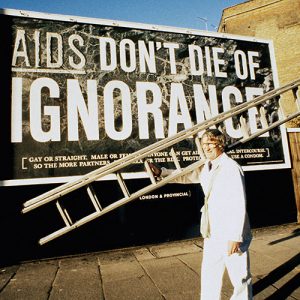
You’ve got a big section on HIV and AIDS – did you find it quite difficult to write the book because there is an awful lot of sadness within our LGBT history?
Well compared to Straight Jacket, it was like a walk in the park, almost. I don’t mean that in a flippant way. One of the reasons why I wanted to write Pride was because it is essentially a positive story. It has a pretty happy ending because of where we are now from where we’ve been is an incredibly positive story. I’m very proud of Straight Jacket and I get messages every week saying you’ve saved my life or you’ve changed my life. It’s amazing, but I know it’s a very painful book to read because it doesn’t pull any punches. So I really wanted to write something that was kind of uplifting. But it was overwhelming, and I did cry quite a lot writing some of the incredible stories.
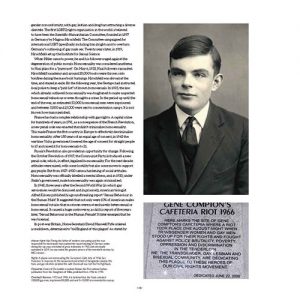
We’re meeting on Pride Saturday and there’s been quite a lot of debate about Pride and Peter Tatchell saying in the old days you could have 100,000 people marching. What’s your take on Pride?
I kind of agree with Peter actually because when I was in my 20s and I was quite scared of going to Pride, people said come to Pride and I was like, ‘No, I don’t need to be that political’, and then when I started going it was so incredibly amazing and liberating. I just took it for granted that you would be part of the protest and join the march. I’m quite shocked over the last few weeks to just see how restrictive it is. I didn’t realise that there’s only 28,000 people allowed on the march as it is today… and the wristbands. I think the corporate thing is really complicated. It’s not black and white. I think that considering what we have lived through when I see rainbow flags in shops, I’m really grateful for that. That said, the lists of businesses on the pride parades, just doesn’t feel right to me. It’s almost like this kind of corporate catalogue of car companies and ExxonMobil, BP and Shell. They are businesses that have spent hundreds of millions of dollars lobbying to NOT take action on climate change. But generally it shouldn’t just be dominated by companies. It should be more about community groups, charities, support groups – all of us in our huge diversity.
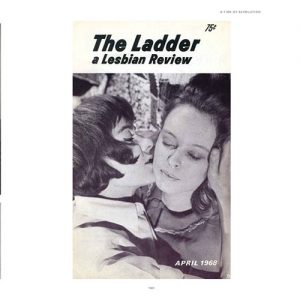
Today you talk on environmental issues as much, if not more, than about LGBT+ issues, why is that?
I do think we’ve taken our eye off the ball to other really important issues that do affect us and that’s one of the main reasons why I focus so much on the environment. David Attenborough keeps saying the collapse of civilisation is on the horizon. I think that goes in one ear and straight out the other for lots of people. Civilisation is what enables us all to live. Especially LGBT people; without civilisation there is no respect for LGBTQ people or women. I don’t think people understand how serious the environmental degradation and climate change is. I think if we don’t stop this – and I don’t know whether we will stop it – I think there’s huge violence on the way, and I’m an effeminate gay man, I can’t fight my way out of a paper bag. When you look online you see there’s a huge amount of hatred from people, lots of different people against lots of different people, and the only thing that keeps those people at bay is civilisation, is the rule of law. If that starts coming under threat, people who don’t like people like me or you or women or black people or Asian people or trans people… If we don’t stop this, it terrifies me.
Can we talk about Straight Jacket, were you surprised at the response and how powerful the book was for readers?
Yes I was, I think it’s because that stuff hadn’t really been said before, and it is an angry book and some of it is really hard-hitting, but I felt there was such denial about what was happening that we needed to puncture that denial; and in fact all the reactions I’ve got have been really, really positive. Some guy wrote – I pinned it on my Twitter – just this amazing thing saying Straight Jacket set me free and changed his life. And people message me all the time saying my parents really want to thank you because I think I was heading for disaster and it helped me realise what was wrong and now I’m in recovery. It makes me really sad because I’m not connected to the party scene any more; I used to love it. I don’t drink any more, I used to love it – and sometimes I do have to meet people who are still in it. It makes me sad, so many people are still in that place of just thinking their only value is what they do in nightclubs, and whether they’re a bear or a twink, and their bodies and stuff like that. I think we just need to shift out of that because it’s just not good for us.
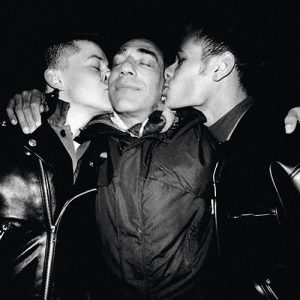
Can you talk about your personal experience, that process you went through with addiction?
I just think I was really screwed up, growing up gay and being bullied. I’m also a very sensitive person. And when I came out it wasn’t in a particularly safe way; I came out to a youth group which was life-saving but in hindsight, it didn’t feel like it was the safest place, you know it was held in someone’s bedsit. And then I came out to the gay scene, and the first time I went out to a gay bar, it was great, I used to love it there but then someone was really, really horrible to me; that happened on and off over the years. I had some great times as well, but it just got to the place where I had a few relationships which were very clingy and obsessive and when I got cheated on by somebody I was really head over heels in love with, I just wanted to kill myself. It was absolutely devastating and I kind of anaesthetised myself with alcohol and then the internet happened, so it was very easy to meet people and just sleeping with loads of people – that can still be a bit of an issue for me. I was a very romantic person when I was younger, I believed I would meet this prince who would sweep me up, and we’d go home and spend the night, and then that would be the beginning of this beautiful relationship. And I would go home with people and then the next morning, they wouldn’t want to ever speak to you again; not always, but a lot of the time; and they’re a bit ashamed, maybe they’re in some dysfunctional place.
Did you ever get heavily into the drugs scene?
I think if I’d been around now, knowing that I’ve got an addictive personality, I think if I had started taking the drugs that are around now I would have been dead. I would have been one of those people that just dies in their sleep. Recovery groups are one of the best things that ever happened to me. I do think that almost all LGBT people have gone through a really traumatic experience growing up, coming to terms with who they are. Sometimes fighting with themselves, trying to suppress it. Not everyone has that, but lots of us do, and you come out to gay culture and the gay scene, and everyone’s like that. They’re like kind of rats out of a trap who are just so excited to be away from the past – and we’re all medicating ourselves through sex and alcohol and validation, which is just – my God – gay men online on Instagram: “Validate me, validate me, validate me!” – and yet none of us know we’re doing it. So it’s quite a messy place. People squabbling online and, like the way we treat each other on apps, isn’t very nice. There is a lot of dysfunction out there.
Can you tell us more about your process of recovery?
My experience of my friends was a lot of people in a lot of pain, damaging themselves in lots of ways and that was my experience of most LGBT people I knew growing up. And so going into recovery, it’s been so amazing because it’s people who have done all that and have had really terrible times but have come out the other side and addressed it, and they are much calmer and I have much more authentic relationships with those people who aren’t drinking and taking drugs. And I’ve met more women, more lesbian women, which has just been really a beautiful thing because it felt quite separatist when I was younger. Gay men that you can have conversations with rather than it just being about ‘Do you want to have sex with me?’. Out of that has come ‘A Change of Scene’ which I run at Dean Street with Simon Marks, who is the therapist, where it’s a discussion group for gay men. I think people get a lot out of it, it’s always full.
Despite all of these improvements in our lives that you’ve recorded in the new book Pride, there’s still all these challenges LGBT people have on an emotional and psychological level?
I do think it’s really important to talk about it. Also I think it’s really important not to be defined by your mental health problems – I’m a recovering alcoholic but it’s actually quite a minor part of my life now and it doesn’t define me. It is about trying to get to a normal way of living – but I do think it’s really important that people are talking. I think it’s really important to engage in a deeper way. I think coming from love is really important because if you start to love and value yourself, you can love and value other people in a more authentic way. And I think when you do that, instead of just being off your head the whole time, when you are emotionally sober enough to like yourself and other people, then you start valuing the world. There’s no LGBTQ rights on a broken planet and we need to wake up, this is an emergency to me. There’s nothing more important because all of us are going to go down with the ship if we don’t stand up and do something about it – whether we’re Left or Right – to me it is beyond politics.
Pride: The Story of the LGBTQ Equality Movement by Matthew Todd is out now, published by Carlton Books.



